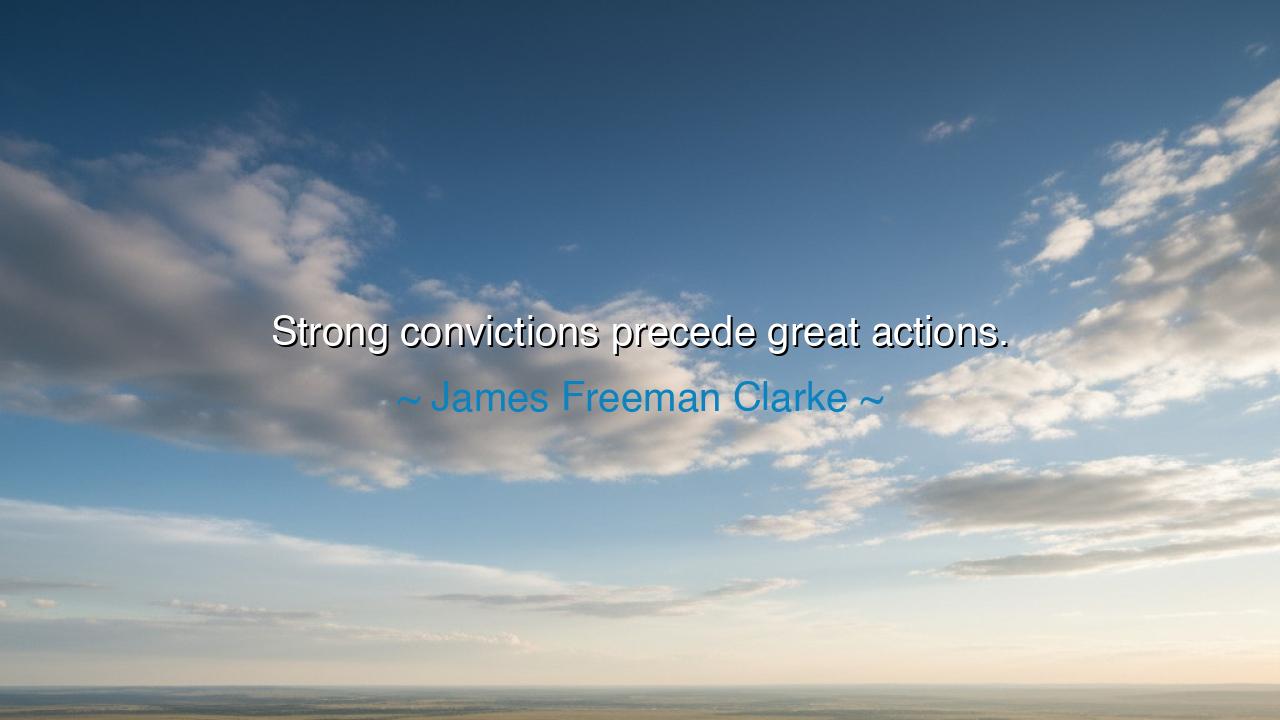
Strong convictions precede great actions.






“Strong convictions precede great actions.” Thus spoke James Freeman Clarke, a philosopher and theologian whose words strike like a timeless bell, echoing through the chambers of conscience and courage. In these few syllables lies the eternal truth that before any mighty deed can rise into the world, it must first be born in the soul’s resolve. No man or woman ever built, discovered, or redeemed anything of worth without first being gripped by an unshakable belief — a conviction so strong that it burned brighter than fear, brighter than doubt, brighter than the comfort of silence.
The ancients understood this well. Every heroic act in the chronicles of humanity began as a fire in the heart before it became a motion of the hand. Conviction is the root; action, the fruit. Without deep belief, action becomes aimless and fragile — like a ship without a compass, moved by every shifting wind. But when conviction anchors the spirit, the individual becomes as steadfast as a mountain. It is conviction that transforms weakness into endurance, and hesitation into purpose. It is the inner vow — the soul’s quiet declaration that something is right, and must therefore be done.
Consider Mahatma Gandhi, who faced an empire with no weapon but faith in truth and nonviolence. His belief that the human spirit could conquer oppression without hatred was not born of chance; it was a conviction cultivated through pain, reflection, and love for justice. When he walked barefoot across India to make salt — a simple act, yet a symbol of defiance — he was not merely acting. He was manifesting an inner certainty that no force could rule the conscience of a free people. The world saw a frail man; history saw conviction incarnate, and through him, millions found their courage.
So too did Joan of Arc, that peasant girl who believed her visions came from Heaven. Mocked, threatened, and condemned, she nevertheless led armies and inspired nations because her conviction burned hotter than her fear of death. She was not guided by the approval of others, but by a voice within — that mysterious certainty which the ancients called “divine purpose.” Even when the flames rose around her, her belief did not falter. And so her life, though brief, kindled a light that France and the world would never forget.
Strong convictions are not the possession of saints and heroes alone — they belong to all who dare to live sincerely. Each of us is called, in some measure, to act upon what we hold to be true. Yet in a world that worships convenience, conviction often feels like rebellion. It demands sacrifice; it demands courage; it demands the willingness to stand alone. But it is only through conviction that humanity has moved forward — through the scientist who questioned accepted wisdom, through the reformer who refused to bow to injustice, through the artist who spoke beauty into a world grown numb. Every great action springs from one person’s refusal to yield to indifference.
Remember, however, that conviction without humility becomes tyranny, and belief without compassion becomes cruelty. The greatest convictions are those that uplift rather than destroy, that seek truth rather than dominance. Clarke’s wisdom is not a call to stubbornness, but to integrity — the alignment of thought, word, and deed. To believe truly is to act rightly; to act rightly is to serve the good that transcends the self.
So let these words be carved upon your heart: “Strong convictions precede great actions.” Before you build, believe. Before you speak, know why you must. Before you stand, understand what you stand for. Let your convictions be forged in truth, tempered by compassion, and tested by hardship. Then, when the moment comes to act, your hand will not tremble, for your heart will already have chosen.
For in the end, the world is not changed by the powerful, but by the steadfast — those who hold fast to what is right when it is neither easy nor popular. Conviction is the flame, and action the light it casts. Keep your flame burning, and in time, your light will guide others through the darkness.






AAdministratorAdministrator
Welcome, honored guests. Please leave a comment, we will respond soon